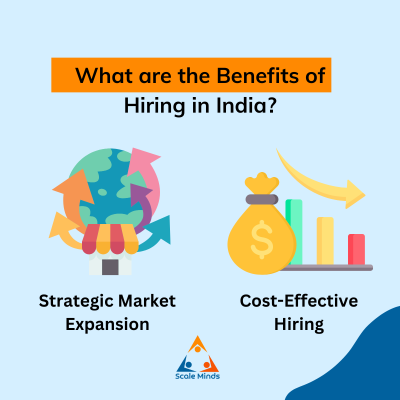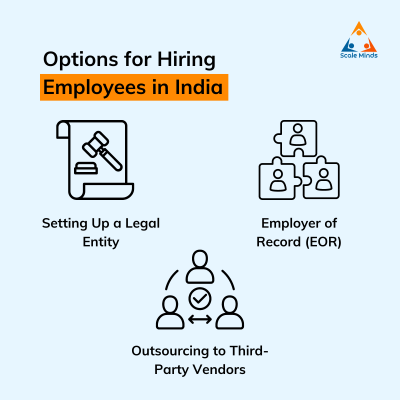In today’s globalized economy, tapping into international talent pools has become a strategic imperative for many U.S. companies aiming to stay competitive. India, with its vast population of over 1.4 billion people and a rapidly expanding base of English-speaking professionals, stands out as a prime destination for sourcing skilled employees. The country boasts a rich talent pool, particularly in sectors like information technology, engineering, and customer service, making it an attractive option for businesses seeking to expand their workforce and global presence.
However, hiring in India is not without its complexities. Navigating the country’s unique legal frameworks, employment regulations, and cultural nuances requires careful planning and understanding. This comprehensive guide aims to walk you through the various aspects of hiring employees in India, from exploring the benefits and methods of recruitment to understanding the legal obligations and best practices for successful integration. Whether you’re considering setting up a local entity, partnering with an employer of record, or hiring independent contractors, this guide will equip you with the knowledge needed to make informed decisions and capitalize on the opportunities that India has to offer.
India has become a focal point for global recruitment, offering a multitude of advantages that make it an attractive destination for U.S. companies seeking to expand their talent base. Here are some compelling reasons to consider hiring in India:

Why Hire in India?
India has become a focal point for global recruitment, offering a multitude of advantages that make it an attractive destination for U.S. companies seeking to expand their talent base. Here are some compelling reasons to consider hiring in India:
Access to a Large Talent Pool
- Vast Population of Skilled Professionals: With a population exceeding 1.4 billion people, India provides one of the largest labor pools in the world. Each year, millions of graduates enter the workforce, many with degrees in engineering, technology, finance, and other specialized fields.
- English Proficiency: India is the second-largest English-speaking country globally, which facilitates clear communication and reduces language barriers when collaborating with U.S. teams.
Cost-Effective Hiring
- Competitive Salary Expectations: The cost of living in India is generally lower than in the United States. This means that salary expectations are comparatively modest, allowing companies to reduce labor costs without compromising on talent quality.
- Lower Operational Expenses: Beyond salaries, other operational costs such as office space, utilities, and administrative expenses are typically less expensive, contributing to overall cost savings.
Time Zone Advantages
- Extended Business Hours: India’s time zone (Indian Standard Time) is approximately 9.5 to 12.5 hours ahead of U.S. time zones. This difference enables continuous business operations, as teams in India can continue work after U.S. offices close, leading to faster project turnaround times.
- 24/7 Customer Support: For companies requiring around-the-clock customer service or IT support, Indian employees can cover overnight shifts relative to U.S. time, enhancing customer satisfaction and operational efficiency.

Diverse Skill Sets
- Strength in IT and Engineering: India is renowned for its expertise in information technology and engineering. Cities like Bengaluru, Hyderabad, and Pune are tech hubs that house a vast number of IT professionals, software developers, and engineers.
- Emerging Sectors: Apart from IT, India has growing proficiency in sectors such as biotechnology, pharmaceuticals, digital marketing, finance, and data analytics, offering a wide array of skills to meet diverse business needs.
- Adaptability and Continuous Learning: Indian professionals often exhibit a strong commitment to learning and adaptability, staying abreast of the latest technologies and industry trends.
Cultural Compatibility
- Global Business Practices: Many Indian professionals are accustomed to working with international clients and teams, familiarizing themselves with Western business etiquette and practices.
- Strong Work Ethic: The cultural emphasis on education and professional achievement translates into a dedicated workforce committed to contributing positively to their organizations.
Educational Excellence
- Premier Educational Institutions: India boasts prestigious institutions like the Indian Institutes of Technology (IITs) and Indian Institutes of Management (IIMs), which produce highly skilled graduates in engineering, technology, and management.
- Emphasis on STEM Education: A strong focus on science, technology, engineering, and mathematics provides a steady stream of qualified candidates for technical roles.
Innovation and Technology Adoption
- Thriving Startup Ecosystem: India has one of the fastest-growing startup landscapes, fostering innovation and entrepreneurial skills that can benefit established companies.
- Advanced Technical Infrastructure: With widespread internet penetration and adoption of cutting-edge technologies, Indian professionals are well-equipped for remote collaboration and virtual teamwork.
Strategic Market Expansion
- Gateway to Asian Markets: Hiring in India can serve as a strategic move for companies looking to expand their footprint in Asia, providing valuable local insights and regional expertise.
- Understanding Local Markets: For businesses aiming to enter the Indian market, local employees offer critical understanding of consumer behavior, regulatory environments, and market dynamics.
Can a U.S. Company Hire Employees in India?

Absolutely, U.S. companies can hire employees in India. However, the process involves more than simply extending job offers to international candidates. It requires a thorough understanding of India’s legal framework, employment regulations, and compliance requirements. Engaging with Indian talent can be a significant asset to your business, but it’s essential to navigate the complexities carefully to ensure a successful and lawful hiring process.
Understanding the Legal Framework
Employment Laws and Regulations
- Labor Laws: India has an extensive set of labor laws designed to protect workers’ rights, including the Industrial Disputes Act, Minimum Wages Act, and Shops and Establishments Act. These laws govern aspects like working hours, termination procedures, minimum wage standards, and employee benefits.
- Statutory Benefits: Employers are mandated to provide certain benefits such as the Employees’ Provident Fund (EPF), Employee State Insurance (ESI), gratuity, and maternity leave. Non-compliance can result in legal penalties and fines.
Business Presence Requirement
- Establishing a Legal Entity: To hire full-time employees directly, your company typically needs to have a legal presence in India. This can be achieved by setting up a subsidiary, branch office, or liaison office. Each type has its own legal implications and operational scope.
- Registration and Compliance: Setting up an entity involves registering with various government departments, obtaining necessary licenses, and adhering to ongoing compliance obligations like tax filings and audits.
Taxation and Financial Obligations
Employer Tax Responsibilities
- Withholding Taxes: Employers must deduct taxes at source from employees’ salaries, known as Tax Deducted at Source (TDS), and remit them to the Indian government.
- Social Security Contributions: Contributions to schemes like EPF (12% of basic salary) and ESI (4.75% of gross salary) are mandatory for employers, adding to the overall employment cost.
Understanding Double Taxation Avoidance
- Tax Treaties: The United States and India have a Double Taxation Avoidance Agreement (DTAA) to prevent income from being taxed in both countries. Understanding how this applies is crucial for financial planning.
Alternative Hiring Options Without a Legal Entity
If establishing a legal entity seems daunting or impractical, especially for companies looking to hire a small number of employees or for short-term projects, there are alternative methods:
Partnering with an Employer of Record (EOR)
- What is an EOR?: An EOR is a third-party organization that acts as the legal employer on your behalf. They handle all compliance, payroll, and HR responsibilities, allowing you to manage the day-to-day activities of the employee.
- Benefits of Using an EOR:
-
- Compliance Assurance: EORs are well-versed in local laws, reducing legal risks.
- Cost-Effective: Avoid the expenses associated with establishing and maintaining a legal entity.
- Speed to Hire: Quickly onboard employees without waiting for entity setup.
Hiring Independent Contractors
- Flexibility: Engaging contractors can be suitable for project-based work or specialized expertise.
- Risks of Misclassification: Misclassifying employees as contractors can lead to legal issues, including back taxes, penalties, and mandatory provision of employee benefits.
- Compliance Measures:
- Clear Contracts: Draft detailed agreements outlining the scope of work, payment terms, and termination conditions.
- Autonomy: Ensure that contractors maintain control over how they perform their work to fit the contractor classification.
Options for Hiring Employees in India
When expanding your workforce into India, it’s essential to choose a hiring method that aligns with your company’s goals, budget, and operational capabilities. U.S. companies have several options for hiring employees in India, each with its own advantages and challenges. Here are the primary methods to consider:
1. Setting Up a Legal Entity in India
Overview
Establishing a legal entity allows your company to hire employees directly and conduct business operations within India. This option is ideal for businesses planning a long-term presence or significant investment in the country.
Types of Legal Entities
- Private Limited Company: Offers limited liability protection and is suitable for most foreign businesses.
- Public Limited Company: Suitable for larger enterprises looking to raise capital through public offerings.
- Branch Office: Enables the parent company to conduct business activities similar to those in its home country.
- Liaison Office: Acts as a communication channel but cannot engage in commercial activities.
- Project Office: Established for executing specific projects in India.
Steps to Establish an Entity
- Decide on the Business Structure: Choose the type of entity that aligns with your objectives.
- Obtain Required Identification Numbers: Secure Director Identification Numbers (DIN) and Digital Signature Certificates (DSC) for company directors.
- Name Approval: Apply to the Ministry of Corporate Affairs (MCA) to reserve your company name.
- Prepare Incorporation Documents: Draft the Memorandum of Association (MOA) and Articles of Association (AOA).
- Company Registration: Submit incorporation documents to the Registrar of Companies (ROC).
- Tax Registrations: Obtain a Permanent Account Number (PAN) and Tax Account Number (TAN) for tax purposes.
- Open a Corporate Bank Account: Necessary for financial transactions.
- Compliance and Licensing: Register for Goods and Services Tax (GST), Provident Fund (PF), Employee State Insurance (ESI), and other relevant licenses.
When to Choose This Option
- Long-Term Market Entry: If you’re committed to a sustained presence in India.
- Large-Scale Hiring: When planning to hire a significant number of employees.
- Complete Operational Control: If you require full autonomy over business operations.
2. Partnering with an Employer of Record (EOR)
Overview
An Employer of Record (EOR) is a third-party organization that legally employs workers on your behalf. This allows you to hire employees in India without establishing a local entity, while the EOR handles compliance, payroll, and HR administration.
How an EOR Works
- Legal Employer: The EOR is the official employer in India, responsible for adhering to local employment laws.
- Operational Management: You manage the employee’s day-to-day activities, performance, and integration into your company culture.
When to Choose This Option
- Testing the Market: Ideal for companies exploring opportunities in India.
- Small to Medium Teams: Suitable when hiring a limited number of employees.
- Avoiding Complexity: When you prefer to avoid the complexities of local compliance and administration.
3. Hiring Independent Contractors
Overview
Engaging independent contractors or freelancers is a flexible option for project-based work or when specialized skills are required temporarily.
Considerations
- Clear Contracts: Use detailed agreements specifying the scope of work, deliverables, payment terms, confidentiality, and intellectual property rights.
- Compliance with Local Laws: Ensure the contractor relationship meets legal criteria to avoid being reclassified as an employer-employee relationship.
- Tax Implications: Be aware of withholding tax requirements and reporting obligations.
When to Choose This Option
- Short-Term Projects: Ideal for assignments with a defined scope and duration.
- Specialized Tasks: When you need specific expertise not available in-house.
- Budget Constraints: Suitable when looking to minimize costs associated with full-time employees.
4. Outsourcing to Third-Party Vendors
Overview
Outsourcing involves contracting an external company in India to handle certain business functions or processes, such as customer service, IT support, or software development.
Considerations
- Due Diligence: Carefully evaluate the vendor’s reputation, capabilities, and compliance with data protection laws.
- Service Level Agreements (SLAs): Establish clear expectations for performance, quality, and timelines.
- Communication Channels: Ensure effective communication mechanisms are in place.
When to Choose This Option
- Non-Core Functions: Suitable for tasks that are not central to your main business operations.
- Resource Limitations: When lacking internal resources or expertise.
- Scalability Needs: To quickly scale operations up or down.
5. Utilizing Staffing Agencies
Overview
Staffing agencies in India can assist in recruiting temporary or permanent staff, handling the initial stages of the hiring process.
Considerations
- Agency Selection: Choose reputable agencies with experience in your industry.
- Contract Terms: Understand the fees, guarantees, and terms of service.
- Onboarding Process: Plan for integrating the new hires into your company culture.
When to Choose This Option
- Immediate Hiring Needs: When you need to fill positions quickly.
- Hard-to-Fill Roles: For specialized positions where candidates are scarce.
- Temporary Projects: When staffing for seasonal or project-based work.
How Much Does It Cost to Hire an Employee in India?
When hiring employees in India, it’s important to account for statutory contributions in addition to the base salary. Employers are typically responsible for contributing a minimum of 16.75% on top of an employee’s base salary due to mandatory social security schemes. Here’s the breakdown:
- Employees’ Provident Fund (EPF): As an employer, you’re required to contribute 12% of the employee’s basic salary to the EPF, which is a retirement benefit plan aimed at helping employees save a portion of their salary for future needs.
- Employees’ State Insurance (ESI): You must also contribute 4.75% of the employee’s gross salary to the ESI, which provides medical, disability, and maternity benefits to employees earning below a certain wage threshold.
These mandatory contributions increase the overall cost of employment and should be factored into your budgeting when planning to hire in India.
What to Know Before Hiring Employees in India?
Navigating the Indian employment landscape requires a thorough understanding of the country’s complex labor laws and employment practices. Compliance is not only a legal obligation but also essential for building a positive employer-employee relationship. Here are key aspects you should be aware of before hiring in India:
Indian Employment Laws and Practices
- Minimum Wage
- Variable Across States and Industries: India does not have a national minimum wage. Instead, minimum wages are determined by individual states and can vary based on the type of work, industry, and skill level of the employee.
- Examples:
- A highly skilled worker like a pharmacist may have a different minimum wage in the state of Karnataka compared to Goa.
- It’s crucial to consult the local state regulations to determine the applicable minimum wage.
- 13th-Month Pay
- Bonus Culture: While a 13th-month salary is not mandated by Indian law, it is common for companies to provide bonuses based on performance or profits.
- Legal Consideration: If a bonus is stipulated in the employment contract, it becomes a legal obligation under the Payment of Wages Act.
- Overtime Regulations
- Eligibility: Employees are entitled to overtime pay at twice their regular wage rate.
- Applicability: Overtime rules typically apply to workers in factories or specific industries who exceed 9 hours a day or 48 hours a week.
- Record-Keeping: Employers must maintain accurate records of hours worked to ensure compliance.
- Paid Time Off (PTO)
- Annual Leave: Employees are generally entitled to a minimum of 15 days of paid leave per year, though this can vary by state and employer policies.
- Casual Leave: Additional casual leave of around 10 days may be provided, allowing employees to take short-term leave without prior approval.
- Sick Leave
- State-Specific Policies: There is no national policy for sick leave; provisions vary by state.
- Integration with Casual Leave: In some states, sick leave may be combined with casual leave allowances.
- Parental Leave
- Maternity Leave:
- Entitlement: Female employees are entitled to 26 weeks of paid maternity leave if they have worked at least 80 days in the past 12 months with the same employer.
- Additional Benefits: Some employers may offer extended leave or flexible working arrangements post-maternity leave.
- Paternity Leave:
- No National Mandate: There is no statutory paternity leave at the national level.
- Company Policies: Some organizations voluntarily offer 1 to 2 weeks of paternity leave.
- Maternity Leave:
- Public Holidays
- National Holidays: India observes three mandatory national holidays:
- Republic Day (January 26)
- Independence Day (August 15)
- Gandhi Jayanti (October 2)
- State Holidays: Additional public holidays vary by state. Employers typically choose around 7 more holidays from the state’s list to grant to employees.
- National Holidays: India observes three mandatory national holidays:
India Payroll Taxes and Employer Contributions
- Employees’ Provident Fund (EPF)
- Contribution Rate: Employers must contribute 12% of the employee’s basic salary to the EPF.
- Purpose: This is a retirement benefit scheme aimed at building a corpus for employees’ future.
- Employees’ Pension Scheme (EPS)
- Allocation: Out of the 12% EPF contribution, 8.33% goes toward the EPS.
- Benefit: Provides pension support to employees after retirement.
- Employees’ State Insurance (ESI)
- Contribution Rate: Employers contribute 4.75% of the employee’s gross salary to the ESI.
- Applicability: Mandatory for companies with 10 or more employees, covering those earning below a certain wage threshold.
- Benefits Provided: Includes medical care, disability benefits, and other social security provisions.
Compliance Risks When Hiring Employees in India
When hiring in India, it’s crucial to navigate the complex landscape of labor laws and regulations to avoid legal pitfalls. Here are key compliance risks to consider:
1. Variations in State Employment Laws
- Diverse Regulations: India comprises multiple states, each with its own employment laws affecting minimum wage, sick leave, overtime rates, and public holidays.
- Action Point: Familiarize yourself with the specific laws of the state where your employees will work to ensure compliance.
2. Incorrect Payroll Contributions
- Mandatory Contributions: Employers must make statutory contributions to schemes like the Employees’ Provident Fund (EPF) and Employees’ State Insurance (ESI).
- Penalties: Failure to accurately contribute can result in fines, back pay obligations, and legal repercussions.
- Action Point: Implement a precise payroll system that adheres to all statutory requirements.
3. Permanent Establishment Risk
- Tax Implications: Having a fixed place of business in India may constitute a permanent establishment, making your company liable for local corporate taxes.
- Action Point: Assess your business activities to determine if they create a permanent establishment and consult tax professionals to manage obligations.
4. Misclassification of Workers
- Employee vs. Contractor: Misclassifying employees as independent contractors can lead to legal issues, including fines and back payment of wages and benefits.
- Action Point: Clearly define worker relationships and ensure they align with Indian classification criteria to avoid misclassification risks.
5. Immigration Requirements
- Hiring Non-Residents: If hiring talent who are not Indian citizens or residents, you must comply with immigration laws and secure proper work visas.
- Action Point: Ensure all foreign employees have the necessary work authorization, possibly with assistance from an Employer of Record (EOR) to simplify the process.
Hire Employees in India Compliantly with Scale Minds
Building a remote team in India is an exciting and rewarding opportunity when done compliantly. Partnering with an experienced firm like Scale Minds eliminates the hassle of setting up a local entity and helps you navigate India’s employment laws with ease.
Our Employer of Record (EOR) solution manages hiring, payroll, benefits administration, HR support, and compliance on your behalf, so you can concentrate on growing your business.
Contact Scale Minds to discover how our solutions can help you quickly and compliantly engage the talented workforce in India and over 185 countries worldwide.
